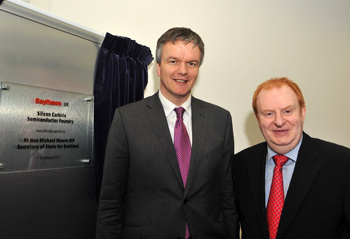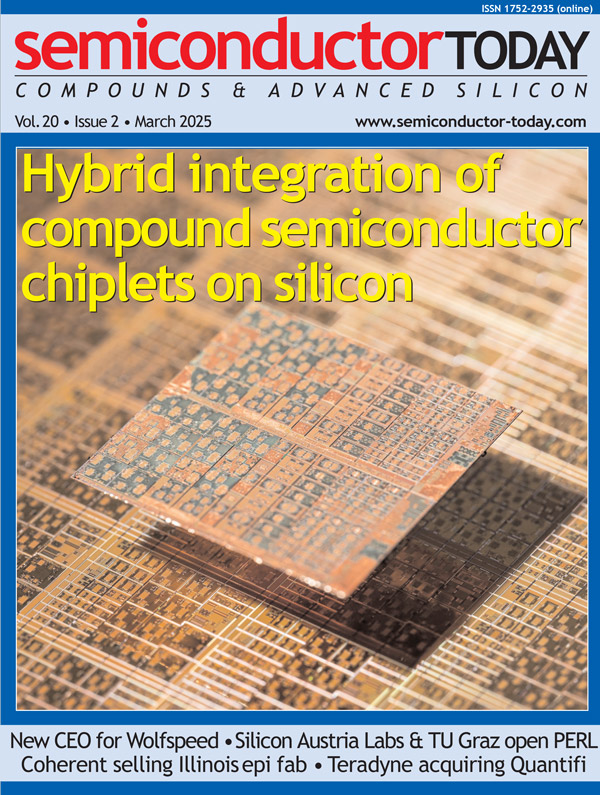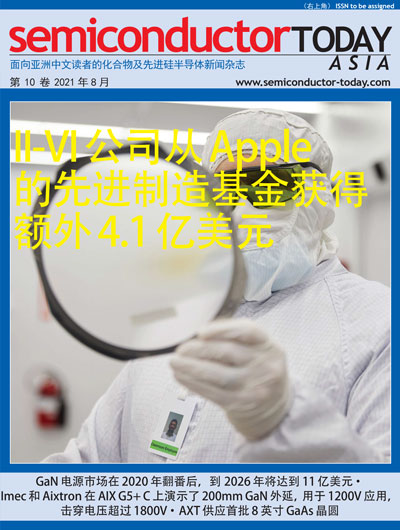- News
31 January 2013
Scotland’s Raytheon Glenrothes opens SiC foundry
Raytheon of Waltham, MA, USA has officially opened a new manufacturing facility for silicon carbide (SiC) foundry at Raytheon Glenrothes in Scotland (part of subsidiary Raytheon UK, a contractor to the UK Ministry of Defence).
Developed through several years of research into manufacturing processes and materials science, the firm reckons that the application of silicon carbide in electronic systems will place the UK in a leading position to develop next-generation, high-efficiency, smaller, low-weight power conversion products used in harsh environments across the automotive, aerospace, geothermal explorations, oil and gas, and clean-energy sectors.
“The silicon carbide foundry is the first of its kind in the UK and represents the fusion of Raytheon’s investment in UK manufacturing technology with university expertise, backed by UK Government funding from the Technology Strategy Board,” said the Right Honorable Michael Moore (the Secretary of State for Scotland), who opened the foundry. “This scientific and engineering endeavour born out of Raytheon Glenrothes has placed Scotland in a unique leadership position globally, enhanced by universities across the UK,” he added. “The investment has created a team of world-class engineering specialists working in the production of silicon carbide devices and systems designed to operate at high temperatures, specialists who will continue to shape and influence advanced manufacturing processes and technologies.”
 Picture: Secretary of State for Scotland Michael Moore unveiling the plaque with Jim Trail, managing director of Raytheon Glenrothes, at the new SiC foundry.
Picture: Secretary of State for Scotland Michael Moore unveiling the plaque with Jim Trail, managing director of Raytheon Glenrothes, at the new SiC foundry.
Raytheon’s silicon carbide processing uses high-temperature annealing and high-temperature/high-voltage ion implantation. The firm says that the components provide unique properties in electronics: SiC can operate at higher voltages and greater temperatures than pure silicon, and at a third of the weight and volume - improving operational performance and reducing system operating costs. Raytheon claims that it is the first firm to have successfully tested SiC circuit devices at temperatures up to 400°C.
“Raytheon’s investment in the foundry coupled with support from the Technology Strategy Board exceeds £3.5m to date,” notes Raytheon UK’s chief executive Bob Delorge. “This places the company at the start of a journey to exploit new global markets for this cost-efficient material, which is estimated to bring significant new business to Raytheon in Scotland in the coming years,” he adds. “We have made substantial commitments to develop new engineering talent to maintain our technological edge in high-temperature silicon carbide. We are supporting PhD students and undergraduates, and we are giving apprentices and young graduates the opportunity to develop their careers,” he continues.
“What was previously unachievable is now possible with silicon carbide as it allows for smaller and lighter electronics to operate in harsh environments, and addresses a real customer need for significant energy-efficiency savings in the manufacture of power switching and rectifying components (AC/DC converters),” Delorge says.
“We have identified advanced materials as one of the eight new technologies in which Britain has a distinct capability and which are critical to scientific advance,” comments UK Universities and Science Minister David Willetts.
“We see Raytheon UK gearing up for future success - through investment, collaboration and diversification,” comments Ian Watson, director of the aerospace, defence, security and space trade organisation, ADS Scotland. “One of the main challenges industry faces as it looks to the future is continuing technological discovery to stay ahead of global competition,” he adds. “To address this challenge, it is vital that industry and academia work together to advance technology and fully explore commercial applications. Raytheon’s new facility at Glenrothes is a brilliant example of this.”
Raytheon UK says that its R&D into SiC manufacturing processes and technology has been aided by collaborative partnerships between Raytheon Glenrothes, UK academia and specific project funding from the UK government’s Technology Strategy Board. Collaborations to date include the following:
- Warwick University has advised on the characterization of SiC;
- University of Strathclyde has worked with Raytheon (funded by the UK government’s Technology Strategy Board) on the High Temperature Silicon Carbide (HiTSiC) program;
- Newcastle University is working as an advisor to Raytheon on the HiTSiC program;
- Heriot Watt University is working with Raytheon to design and build packaging solutions for harsh environments;
- University of Edinburgh has worked with Raytheon to conduct market research on exploiting disruptive technologies; and
- Manchester University has partnered with Raytheon to develop SiC technology for the Pro Drive



